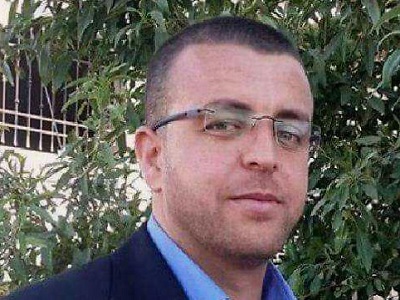
Palestinian journalist Muhammad al-Qiq, who has been on hunger strike in Israeli jail for 61 days, is on brink of death, the journalist’s lawyer told Ma’an on Monday.
After visiting al-Qiq earlier in the day, Ashraf Abu Sneina, a lawyer with the Palestinian Authority’s Committee for Prisoners’ Affairs, said al-Qiq was unconscious and unable to speak, adding that he had exhibited “sudden symptoms that could lead to his death.”
The head of the committee, Issa Qaraqe, accused Israel of “reckless and indifferent treatment of al-Qiq,” which he said stemmed from “a decision by the extremist Israeli government and its intelligence to let him die.”
The 33-year-old journalist from the southern West Bank town of Dura has been on hunger strike to protest his administrative detention, internment without trial or charge, since Nov. 24.
Qaraqe called on all appropriate organizations and human rights groups to exert every means available to pressure Israel to free al-Qiq, “because if he dies as a martyr, the situation will deteriorate both among Palestinians inside and out of Israeli prisons.”
“Israel has to be aware that it will pay a heavy toll if Muhammad dies in custody,” Qaraqe said.
As al-Qiq is being held in administrative detention, any possible evidence against him has been kept secret by the Israeli authorities.
However, Amnesty International reported last week that the military judge at the Ofer Military Court said al-Qiq’s file “accuses him of ‘incitement,’ of working with media associated with Hamas … and also of being a ‘threat to the security of the area.'”
Following Amnesty’s report, Mahmoud Ulayyan, a member of Gaza’s journalism union, said that al-Qiq was evidently being held due to his work as a journalist, and that Palestinian journalists urgently needed protection from the “continuous Israeli violations” launched against them.
Amnesty demanded that Israel either release or charge al-Qiq, adding that he has been mistreated and tortured in ways that violate international law.
On Jan. 19, medical rights group Physicians for Human Rights Israel (PHRI), said the group had found that doctors in HaEmek Hospital in Afula, where al-Qiq is being treated, were “forcing treatment upon (al-Qiq) and pressuring him to end his hunger strike.”
PHRI called on doctors to stop the “forced treatment” and respect international human rights law, which says hunger strikers cannot be forced or pressured to intake food or supplements.
The group said the hunger striker had been “hooked up against his will to an infusion of salts and vitamins, and blood was taken with the permission of the hospital’s ethics committee.”
“Al-Qiq was tied to the bed and forcefully held down by prison wardens while a member of the medical staff made the infusion. For four days al-Qiq remained tied to the bed, hooked up to the IV drip, while pleading for its removal, to no avail,” the group said at the time.
Doctors later removed the drip, but PHRI said that their actions continued to “contradict the World Medical Association’s declarations on hunger strikers, to which medical personnel in Israel are committed, including the Malta Declaration which forbids both applying pressure to end a hunger strike and forced medical treatment.”
Last week, it was reported that 71 British doctors had called on the World Medical Association to expel the Israeli Medical Association from the body, claiming that Israeli doctors had carried out “medical torture” on Palestinians.
(MAAN)





